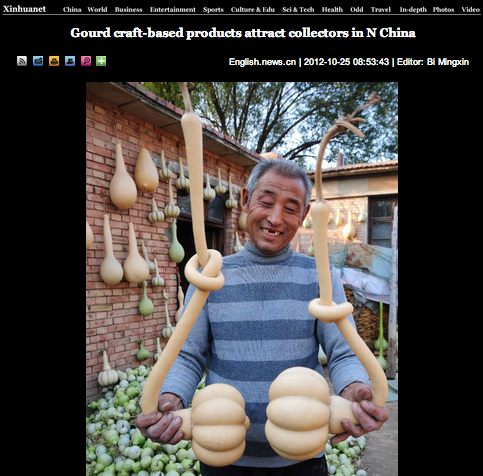Blogs » Society » How to build a good public life?
Blogs » Society » How to build a good public life? |
- How to build a good public life?
- Shanghai, Beijing praised for air pollution monitoring, but more can be done
- Huawei partner offered to sell US equipment to Iran
- PLA Held Military Exercise Against Imaginary Cantonese-Speaking “Blue Army”
- Ai Weiwei, Gangnam Style
- Associated Press Films A PC Desktop Playing Ai Weiwei’s Gangnam Parody, Washington Post Labels It “Raw Video”
- Ningbo girl climbs in sewer to rescue phone, gets stuck
- Kindergarten teacher’s child abuse photo album sparks public fury
- Chinese ships enter Diaoyu waters for first time in three weeks
- Beijing Slice Ep09: Climbing The Waterfall
- Angry Birds teams up with McDonald's
- Facebook: We want our fans back (Announcement)
- Presented By:
- HALLOWEEN Parties: Weekendist Special Edition (Oct 26-31)
- Watch: Illegal Shanghai taxi driver runs over German, twice
- GM crops blamed for rise in "superweeds" in US
- Gender Gap Report: Chinese society fairly equal, Chinese politics not so much
- True reform in China is impossible until the PLA is nationalised
- I can't tell whether Spencer Tarring is joking or an idiot
- Does This Look Like A Fallopian Tube To You? A Case In Gender Studies
| How to build a good public life? Posted: 25 Oct 2012 09:36 PM PDT 
This week's digest brings together two recent pieces which, in different ways, show the influence of the Western cannon on Chinese intellectual life. In 'How to build a good society', Zhant Tianpan reviews professor Ren Junfeng's book on civic virtue and civic government, itself based on a reading of Toqueville's "Democracy in America". In 'Love and Justice', Professor Chen Hongguo proposes a 'reading list' of nine key texts for thinking broadly about this topic, a majority of which reflect 'universal' European and American experience. How to build a good public life? In this post, Zhang Tianpan reviews of a book recently published by political scientist Ren Junfeng on civic virtue and civil government. Marco Polo translation: How to build a good public life? Love and Justice In this post, professor Chen Hongguo proposes a reading list as a basis for reflecting on the broad question of love and justice. Aside from giving titles, he sums up the core argument of the book, and reasons for proposing it. Marco Polo translation: Love and Justice All articles in this digest and a large range of other Chinese readings are accessible at Marcopoloproject.org. Some are available in English, French and Spanish translation. (You can join the project if you'd like to help with translations.) Danwei is an affiliate of the Australian Centre on China in the World at The Australian National University. This posting is a result of one project that is part of that on-going collaboration. The China Story, China Heritage Quarterly and East Asian History are publications of the Australian Centre on China in the World. |
| Shanghai, Beijing praised for air pollution monitoring, but more can be done Posted: 25 Oct 2012 09:00 PM PDT  There has been a marked improvement in the provision of air quality data in a number of Chinese cities, including Shanghai, Beijing, and Guangzhou. However, NGOs suggest that the government could be making better use of real-time air pollution reports, and some cities lack any reports whatsoever. [ more › ] There has been a marked improvement in the provision of air quality data in a number of Chinese cities, including Shanghai, Beijing, and Guangzhou. However, NGOs suggest that the government could be making better use of real-time air pollution reports, and some cities lack any reports whatsoever. [ more › ]     |
| Huawei partner offered to sell US equipment to Iran Posted: 25 Oct 2012 08:00 PM PDT  More bad news for Huawei. As if being classed as a "significant security concern" by the US Congressional Intelligence Committee wasn't enough to scupper any ambitions the firm had in America, Reuters have now revealed that an Iranian partner of Huawei, "last year tried to sell embargoed American antenna equipment to an Iranian firm". [ more › ] More bad news for Huawei. As if being classed as a "significant security concern" by the US Congressional Intelligence Committee wasn't enough to scupper any ambitions the firm had in America, Reuters have now revealed that an Iranian partner of Huawei, "last year tried to sell embargoed American antenna equipment to an Iranian firm". [ more › ]     |
| PLA Held Military Exercise Against Imaginary Cantonese-Speaking “Blue Army” Posted: 25 Oct 2012 08:02 PM PDT On Oct 25th, CCTV reported that PLA Hong Kong garrison held an military exercise against an imaginary Cantonese-speaking "Blue Army".  The military exercise was set in ordinary Hong Kong streets. Source "Blue Army": Hong Kong Separatism According to Oct 26th Metro Daily,
****Publish First. More Later**** |
| Posted: 25 Oct 2012 07:46 PM PDT
Fortunately, Mr. Ai is an extraordinary visual artist–and heroic dissident, 'cause he sure can't dance Still I love it, and he remains my hero. For a few bits of analysis, see the NYT's 'Ai Weiwei Covers 'Gangnam Style' Video.' And, if you don't know what 'grass-mud horse' also sounds like in Chinese, write me. |
| Posted: 25 Oct 2012 07:15 PM PDT We have officially just seen what happens when a 120-year-old man time travels from the 1910s to the 2010s and is told to "put that Ai Weiwei Gangnam video on the Internet." His head doesn't explode, but we wish it did. Look at the above. Just look at it as you would a Millie Brown art exhibition of vomit and bodily goo. "Raw Video," Washington Post calls it in its headline. If this didn't bum me out so much about media's prospects, I'd type 100 "ha's" and leave it at that. The worst part? It fucking autoplays. |
| Ningbo girl climbs in sewer to rescue phone, gets stuck Posted: 25 Oct 2012 07:00 PM PDT  In Ningo, Zhejiang province, a 21-year-old woman waiting for the bus dropped her cellphone case in the sewer. She lifted the grate covering the pipe and crouched down inside to retrieve the case. However, when she tried to stand up again she found she was trapped, after struggling for 20 minutes she eventually had to call emergency services. Fire-fighters arrived and cut a wider hole to then pull the woman out of. (More photos after the jump) [ more › ] In Ningo, Zhejiang province, a 21-year-old woman waiting for the bus dropped her cellphone case in the sewer. She lifted the grate covering the pipe and crouched down inside to retrieve the case. However, when she tried to stand up again she found she was trapped, after struggling for 20 minutes she eventually had to call emergency services. Fire-fighters arrived and cut a wider hole to then pull the woman out of. (More photos after the jump) [ more › ]     |
| Kindergarten teacher’s child abuse photo album sparks public fury Posted: 25 Oct 2012 05:53 PM PDT A young female kindergarten teacher pulls a little boy off the floor by his years. She keeps smiling, while the boy are crying out loud, his ears twisted out of shape. This was the most circulated image on Chinese social media yesterday. The very first person that shed light on the child abuse was a net user under the alias "Jiangjiang090080," who uploaded the aforementioned photo onto Sina Weibo, the Chinese Twitter, on the morning of October 24. This is obviously a new user. All of the handful of posts published under this account were about child abuse committed by the same kindergarten teacher. The user wrote under one photo, "Hope any news organization with a good conscience can go investigate it." Within hours, the ear-pulling photo was all over the place on Sina Weibo. Net users were so outraged by the scene that they spread the image around, vowing to ferret out the identity of the monster and bring her to justice. What ensued was a new round of 'Human Flesh Search', a spontaneous effort made by Chinese Internet vigilantes to punish the morally wrong by exposing their identities and subjecting them to public shaming, using crowdsourced human intelligence. Soon, the collective wisdom of online crowds has led to important findings: Her name is Yan Yanhong. She was born in 1992 and is now teaching at a private kindergarten in the city of Wenling in eastern China's Zhejiang province. Netizens even made public her state ID number, her cell phone number, her QQ (a popular instant messaging tool in China) account, her home address and her educational background. In her blog hosted by QQ, hundreds more troubling torture images can be found, in which she seals off a boy's mouth with scotch tape, throws a boy into a trash bin, takes off a boy's pants and exposes his genitals, makes a boy and a girl kiss one another… Under some of the photos, she writes, "Deserves it." A few net users left comments and advised her to delete these photos, to which she replied, "Not a big deal." "I throw him in," she wrote as the caption. "Try to be disobedient!" The boy is made to keep a kowtow position: kneeling and touching his forehead to the floor. "Try to be disobedient!" "Aunt (referring to herself) makes them so." Empty bottles of Tsingtao Beer at the corner of the classroom. Was she even sober? Yan Yanhong was fired by the kindergarten and arrested by the local police on charges of "making a public disturbance"on the same day. The cruelties she has inflicted on her students seem to come to an end, but the lessons on preventing child abuses that have percolated Chinese schools have just begun. By some estimates, about 40 percent of Chinese children are victims of various forms of maltreatment. 4.4 percent of them are severely abused. More than half of boys and nearly one third of girls suffer from physical punishment. One third of Chinese children have been publicly humiliated. About 2 percent have been sexually abused. An unscientific poll conducted by Sina Weibo right after the infamy of the villainous kindergarten teacher showed that of the 4,835 netizens that responded to the poll, 72.3 percent said they were "beaten by their teachers" at school. Sina Weibo poll Most children are not even aware that they have been abused. Parents, who are occupied with their own jobs and businesses, do not often communicate with their kids and are therefore uninformed about what happens at school. There is no governmental child-protection services or social groups that step in to stop child abuses. Moreover, there are two widespread notions in China that have impeded efforts to fight child abuse: one, "Spare the rod, spoil the child," that children can be and must be physically punished if they are expected to behave. Two, don't meddle with what's under another's roof; mind your own business, even if you see bruises on the body of a boy at your son's class. And the fact that Yan Yanhong was charged with "making a public disturbance" instead of violation of any child-protection law is a wake-up call for China. The local police say that they have come up with such an accusation because they are left with no other choice. There is no such crime as "child abuse" in China. The crime of "abuse" is defined to be concerning members of the same family. "Intentional injury" is applicable only when some degree of physical injury has been inflicted, which in Yan's cases has not. What probably frightens Chinese netizens most is the twisted mentality of teachers and caregivers like Yan who seek pleasure in torturing the weak and the vulnerable even though they themselves used to be a victim. "I simply thought this was fun," Yan talked to a reporter after she was found out. If the abused, after growing up and getting over the pains they received as a child, become abusers and pass down the tradition, thinking that it is a rite of passage and a chance to take it out, it will probably take at least a generation to clean it up. |
| Chinese ships enter Diaoyu waters for first time in three weeks Posted: 25 Oct 2012 06:00 PM PDT  Japan's foreign ministry has issued a strong protest with China's ambassador in Toyko after the Japanese coast guard spotted four Chinese surveillance ships near one of the disputed Diaoyu islands in the East China Sea early on Thursday morning. [ more › ] Japan's foreign ministry has issued a strong protest with China's ambassador in Toyko after the Japanese coast guard spotted four Chinese surveillance ships near one of the disputed Diaoyu islands in the East China Sea early on Thursday morning. [ more › ]     |
| Beijing Slice Ep09: Climbing The Waterfall Posted: 25 Oct 2012 09:39 AM PDT Some of Beijing's best expat climbers they take on the waterfall at Bai He. Featuring Simon Adams, Ben Cook, Dave Gliddon, and Joachim Corstiaans. To learn more about climbing in and around Beijing, visit Beijing Climbing Club. The music featured in this episode is Begging In Rome by Cut By Ice and Départ by OpenChords. Previously: Beijing's Cheapest Haircut. |Beijing Slice Archives| |
| Angry Birds teams up with McDonald's Posted: 25 Oct 2012 09:45 AM PDT  You've undoubtedly spotted these scowling, yet undeniably adorable feather-balls lurking at Shanghai's McDonalds, maybe as giant stuffed animals, toys, or window stickers with fake cracks surrounding them as if they were slingshotted into the window. That's because Angry Birds creator Rovio has joined forces with the fast food giant in a nationwide cross-promotion. [ more › ] You've undoubtedly spotted these scowling, yet undeniably adorable feather-balls lurking at Shanghai's McDonalds, maybe as giant stuffed animals, toys, or window stickers with fake cracks surrounding them as if they were slingshotted into the window. That's because Angry Birds creator Rovio has joined forces with the fast food giant in a nationwide cross-promotion. [ more › ]     |
| Facebook: We want our fans back (Announcement) Posted: 25 Oct 2012 09:00 AM PDT  Shanghaiist recently reached 20,000 fans on our Facebook page (as of writing we have 20,402). That's 20,000 people who have told Facebook that they want to see our posts in their news feed, and yet, because of a new algorithm designed precisely to bleed small time publishers and blogs for money they don't have, our posts reach barely 10% of our total fans. [ more › ] Shanghaiist recently reached 20,000 fans on our Facebook page (as of writing we have 20,402). That's 20,000 people who have told Facebook that they want to see our posts in their news feed, and yet, because of a new algorithm designed precisely to bleed small time publishers and blogs for money they don't have, our posts reach barely 10% of our total fans. [ more › ]     |
| Posted: 25 Oct 2012 09:00 AM PDT |
| HALLOWEEN Parties: Weekendist Special Edition (Oct 26-31) Posted: 25 Oct 2012 07:36 AM PDT  Here it comes, our almost immaculate summary of all the ghost-friendly parties in town! You wanna know what's going on this weekend and on Halloween? We have picked the cool parties and bar events. All those events encourage you to appear in full masquerade, and many of them even hand out prizes to the best costumes: Zombies, ghouls, mermaids, slutty nurses, greedy vampires, mummies, whatever you can think of! Read on for all the details, or check out our calendar for more! [ more › ] Here it comes, our almost immaculate summary of all the ghost-friendly parties in town! You wanna know what's going on this weekend and on Halloween? We have picked the cool parties and bar events. All those events encourage you to appear in full masquerade, and many of them even hand out prizes to the best costumes: Zombies, ghouls, mermaids, slutty nurses, greedy vampires, mummies, whatever you can think of! Read on for all the details, or check out our calendar for more! [ more › ]     |
| Watch: Illegal Shanghai taxi driver runs over German, twice Posted: 25 Oct 2012 07:00 AM PDT On July 15 this year, a German named Sasha and two friends were picked up by an unlicensed taxi on Fuzhou Road, near the Bund. The driver, Wang Mou, asked for 100 RMB so Sasha left the car in disgust while he friends continued to try and negotiate the price down. When Sasha approached the car again, the driver accelerated, running over Sasha and fracturing his leg. Rather than stop to help, the driver runs over the fallen German again and flees the scene. [ more › ]     |
| GM crops blamed for rise in "superweeds" in US Posted: 24 Oct 2012 09:48 AM PDT Genetically modified (GM) food crops are being blamed for a growing weed-resistance epidemic in the US as experts urge return of traditional crop rotation and diversity. Genetically engineered crops dominate cotton, soybean and corn farming in the US, accounting for more than 85% of the total acreage of all three. |
| Gender Gap Report: Chinese society fairly equal, Chinese politics not so much Posted: 25 Oct 2012 06:00 AM PDT  The World Economic Forum has released the 2012 edition of it's annual Global Economic Gender Gap Report (pdf). China is ranked 69th of 135 countries (lower number = more equal), mainly due to the huge gender gap within the CPC. [ more › ] The World Economic Forum has released the 2012 edition of it's annual Global Economic Gender Gap Report (pdf). China is ranked 69th of 135 countries (lower number = more equal), mainly due to the huge gender gap within the CPC. [ more › ]     |
| True reform in China is impossible until the PLA is nationalised Posted: 25 Oct 2012 05:00 AM PDT  It's easy to forget that the People's Liberation Army, the largest military force in the world, is not actually the army of China, but the military wing of the CPC. Liz Carter at Tea Leaf Nation highlights the growing clamour, in this time of political transition, for the PLA to be nationalised. [ more › ] It's easy to forget that the People's Liberation Army, the largest military force in the world, is not actually the army of China, but the military wing of the CPC. Liz Carter at Tea Leaf Nation highlights the growing clamour, in this time of political transition, for the PLA to be nationalised. [ more › ]     |
| I can't tell whether Spencer Tarring is joking or an idiot Posted: 25 Oct 2012 04:00 AM PDT  Spencer Tarring, aka DJ Spenny, claims to be "Shanghai's No. 1 DJ" and writes a semi-regular column for City Weekend: Shanghai which is either an Onion-esque, practically pitch-perfect parody of every puffed-up idiotic British DJ; or the ramblings of a sexist, egotistical moron. [ more › ] Spencer Tarring, aka DJ Spenny, claims to be "Shanghai's No. 1 DJ" and writes a semi-regular column for City Weekend: Shanghai which is either an Onion-esque, practically pitch-perfect parody of every puffed-up idiotic British DJ; or the ramblings of a sexist, egotistical moron. [ more › ]     |
| Does This Look Like A Fallopian Tube To You? A Case In Gender Studies Posted: 25 Oct 2012 01:59 AM PDT Here is Xinhua's latest slideshow, "Gourd craft-based products attract collectors in N China." We tried, briefly and unsuccessfully, to see penises where there were none, for gourds, however phallic, fall short of the "unintentional dong" standard. But there is something better. There is something better indeed. Fallopian tubes. Yes, the good ol' f-tubes. The rollicking double fallope. The tip-top durable oviducts. The trusty utero-tubal superhighway. Determined to confirm what is clearly an overt attempt by one of China's major organs (of state media, I mean) to incept us with images of the female anatomy (for what purpose? Creation as a sublimated desire of procreation, art standing in for sex? Unclear for the moment), I posed the question "Does this look a fallopian tube to you?" to several people on gchat. The responses I got were very, very interesting, and — I'm not going to lie — probably say more about one's gender than anything else. I'll divide the answers into two groups: Men and Women.
First, the ladies, who decided that the picture in fact didn't really look like fallopian tubes, due to its knots and upside-downness: The guys had no such equivocations. If you, in looking at the Chinese man's beautiful gourds, saw fallopian tubes, that makes you a MAN, man: Only one person abstained: (H/T Alicia) |
| You are subscribed to email updates from Update » Blogs » Society To stop receiving these emails, you may unsubscribe now. | Email delivery powered by Google |
| Google Inc., 20 West Kinzie, Chicago IL USA 60610 | |


























Comments